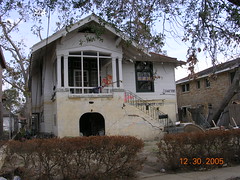
New Orleans: Katrina's "high tide" as measured on a lakeside area house / photo Jenifer Hill Akers
Originally uploaded by trudeau.
* You need not enter the competition nor make a backboard display. Top students will be invited and counseled in preparing entries for the fair.
* Last year several of my students (freshmen) won in the regionals and competed in Baton Rouge. I was enormously proud of them. Their time away from school at each level of competition was very productive. The CMHS competition day is Jan. 19.
Objectives are as follows:
The student...
Demonstrates the use of analytic-scientific procedures in a visual and verbal presentation by
Gathering and analyzing data;
Interpreting findings;
Reporting conclusions; and
Using appropriate social studies research methods and skills.
The teacher...
Uses varied instructional techniques for guiding students in understanding social studies concepts and research methodology.
The project should meet the following requirements.
Focus The scope of the subject should be neither too limited nor too broad. The data should be arranged in a clear and meaningful pattern and presented in a manner that will command interest and communicate understanding of the subject to others.
Unity Every project must have a unifying theme with a point of departure, subject development, and specific conclusions involving the evaluation and interpretation of data.
Topics for study are unlimited, especially at the local level. Examples include studies of business, churches, government, people, community change, and rural and urban problems. Gathering information concerning one project may require distribution of questionnaires to a sample of people and tabulation of the results; another project may be based on the study of manuscripts and/or newspapers; and still another project may be based on studying the government publications of some specialized agency. The following are sources of information.
Newspapers, magazines, published letters, memos
Unpublished manuscripts (wills, letters, deeds, church minutes, diaries)
Government publications (international, national, state and local)
Publications by private agencies
Physical remains (buildings, battle areas, artifacts)
Oral interviews, polls and questionnaires, photographs, sound recordings, and films
Internet web sites.
As a rule, a good researcher uses a variety of these sources of information. The use of one often leads to the use of another. The following are some tools used by social scientists to gather reliable data. Successful past projects have utilized as many of these tools as were appropriate to the subject researched.
Case studies
Experiments
Observations
Graphic studies
Historical examinations
Maps
Samples
Surveys
Statistical analysis
Interviews
The following are suggested as ideas for illustrating information and results on the display board.
Artifacts
Charts
Computers
Diagrams
Graphics
Graphs
Historical collections
Maps
Mock-ups
Murals
Photographs
Recordings
Slides
Videotapes
Selecting a topic . . .
I. Gathering and Analyzing
A. Avoid topics that are limited.
Example: How many states are in the United States?
A student cannot write a report on a topic that can be explained in a few words or a sentence.
Better topic: What valuable resources are found in the southern states?
B. Avoid topics that are too broad.
Example: What happened during the Civil War?
Topics which are too big make it impossible to find all the information that is needed to cover the topic adequately.
Better Topic: What was Atlanta's role in the Civil War?
C. Some topics have no available information.
Example: Why did Henry Hudson get into trouble with the crew of his ship?
We often do not know exactly why people did what they did in the past.
D. Avoid topics that are confusing because we cannot tell what information is requested.
Example: What do people of Japan like?
We know that the people of Japan may differ in their likes and dislikes.
Better topic: What are the favorite sports of the people of Japan?
E. Avoid topics on which people throughout the world cannot agree.
Example: What is the most powerful country in the world?
Your topic should be supported with facts. You should use these facts to form your own opinions.
Better topic: Why might Japan be considered one of the strongest economic powers in the world?
II. Gathering and Analyzing Data
A. Formulate a research question. The question must be related to one or more of the social studies disciplines (anthropology, economics, geography, history, political science, sociology/psychology).
B. Seek guidance for developing your chose topic from your teacher(s), media specialist, and /or other resource persons.
C. Research the topic from a social studies viewpoint rather than investigating it as a natural science.
Example: Nuclear power as a political issue rather than "how it works."
D. Take notes that are related to answering your question.
III. Using References
A. Alphabetize by the first letter in the reference.
B. Italicize the title of the book or magazine cited.
C. Put quotation marks around titles of articles.
D. Include month, day, and year for daily or weekly magazines or newspapers.
E. Indent if the reference takes more than one line.
F. End each citation with a period.

No comments:
Post a Comment